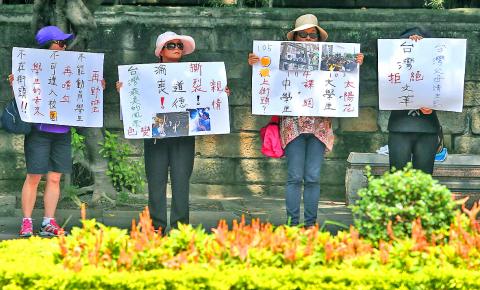“He was not a kid who could be manipulated by political parties,” said the mother of Dai Lin (林冠華), who apparently took his own life on Thursday last week allegedly in protest against high-school curriculum guideline changes.
Underlining her son’s determination to “stir up public opinion with his death,” Lin’s mother blames herself for having misunderstood him.
“It is society, adults and parents who have been brainwashed, like me, that need treatment,” she said.

Photo: CNA
Shih Hsin University professor Wang Hsiao-po (王曉波), a Chinese Nationalist Party (KMT) member and convener of the Ministry of Education’s (MOE) curricular adjustment committee, has accused opposition parties of hiding behind and instigating student protests.
Lin’s mother responded to Wang’s allegations on Facebook.
“He was not a kid who could be manipulated by political parties. He was not blind; he was true to his own will and had followers,” she wrote.
“Please do not claim that the students are manipulated by political parties. Kuan-hua used all the pocket money I gave him to print fliers for the curriculum protest movement. He often had just one meal a day; I thought he had been squandering his money. [The protesters] were so abandoned and unaided, with their voice unheard, exactly because they have not been supported by any political party. Please listen to what these pure children have to say with a genuine heart,” she wrote.
Lin’s mother asked her son to forgive her.
“I misunderstood you and exposed you to pressure. I mistook a gem for a dimwit. Only now do I understand your perseverance and willpower to achieve your ideal. It is society, adults and parents who have been brainwashed, like me, that need treatment. You were a little prince, who had pure thinking. You completed your mission,” she added.
After looking through information, video clips and her son’s mobile phone, Lin’s mother said: “I have been moved by what he was doing.”
Lin’s mother said that her son was a child who lived according to his will, resisting traditional disciplining and teaching, which caused constant family conflict.
He would apply for withdrawal from school, for example, in order to concentrate all his efforts into the movement, his mother said.
“However, we, as parents, accused him of misplacing his intelligence,” and in turn made him feel that he had let his parents down, she said.
“He insisted on what he believed was right; he wanted the public to realize how important the issue is,” she said. “Witnessing that so many of Kuan-hua’s friends wish to continue putting their efforts into his cause, I am stunned. He stirred the public with his actions.”
Lin’s mother uploaded a photograph on Facebook showing the sit-in at the ministry compound, asking the public to stop saying that the students have been manipulated.
“They have been so isolated because they have had no political support,” she said, adding that if adults could not believe that the younger generation is capable of thinking independently, then they are admitting to their own failure in education.
In addition to Lin’s participation in the Sunflower movement in March last year, he also offered “free hugs” outside the Taipei MRT system’s Jiangzicui Station (江子翠) after Cheng Chieh’s (鄭捷) killing spree in May last year, where Lin carried a banner reading: “We have all been too indifferent.”

Taipei has once again made it to the top 100 in Oxford Economics’ Global Cities Index 2025 report, moving up five places from last year to 60. The annual index, which was published last month, evaluated 1,000 of the most populated metropolises based on five indices — economics, human capital, quality of life, environment and governance. New York maintained its top spot this year, placing first in the economics index thanks to the strength of its vibrant financial industry and economic stability. Taipei ranked 263rd in economics, 44th in human capital, 15th in quality of life, 284th for environment and 75th in governance,

Greenpeace yesterday said that it is to appeal a decision last month by the Taipei High Administrative Court to dismiss its 2021 lawsuit against the Ministry of Economic Affairs over “loose” regulations governing major corporate electricity consumers. The climate-related lawsuit — the first of its kind in Taiwan — sought to require the government to enforce higher green energy thresholds on major corporations to reduce emissions in light of climate change and an uptick in extreme weather. The suit, filed by Greenpeace East Asia, the Environmental Jurists Association and four individual plaintiffs, was dismissed on May 8 following four years of litigation. The

A former officer in China’s People’s Liberation Army (PLA) who witnessed the aftermath of the 1989 Tiananmen Square massacre has warned that Taiwan could face a similar fate if China attempts to unify the country by force. Li Xiaoming (李曉明), who was deployed to Beijing as a junior officer during the crackdown, said Taiwanese people should study the massacre carefully, because it offers a glimpse of what Beijing is willing to do to suppress dissent. “What happened in Tiananmen Square could happen in Taiwan too,” Li told CNA in a May 22 interview, ahead of the massacre’s 36th anniversary. “If Taiwanese students or

The New Taipei City Government would assist relatives of those killed or injured in last month’s car-ramming incident in Sansia District (三峽) to secure compensation, Mayor Hou You-yi (侯友宜) said yesterday, two days after the driver died in a hospital. “The city government will do its best to help the relatives of the car crash incident seek compensation,” Hou said. The mayor also said that the city’s Legal Affairs, Education and Social Welfare departments have established a joint mechanism to “provide coordinated assistance” to victims and their families. Three people were killed and 12 injured when a car plowed into schoolchildren and their